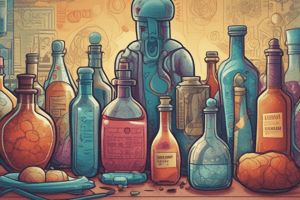Podcast
Questions and Answers
What is the mechanism of Type III hypersensitivity?
What is the mechanism of Type III hypersensitivity?
- Mediated by a T-cell response
- Involves the binding of antigens to IgE antibodies
- Initiated by direct effects on mast cells
- Formation of immune complexes that cause local inflammation (correct)
Which of the following is an example of Type IV hypersensitivity?
Which of the following is an example of Type IV hypersensitivity?
- Hemolytic anemia
- Serum sickness
- Contact dermatitis from poison ivy (correct)
- Anaphylaxis
How long after exposure do symptoms of Type IV hypersensitivity typically appear?
How long after exposure do symptoms of Type IV hypersensitivity typically appear?
- 48-72 hours (correct)
- 12-24 hours
- Immediately
- 24-48 hours
What is NOT a characteristic of Type III hypersensitivity?
What is NOT a characteristic of Type III hypersensitivity?
What triggers 'red man syndrome' during drug exposure?
What triggers 'red man syndrome' during drug exposure?
What is defined as any substance that can harm a living organism?
What is defined as any substance that can harm a living organism?
Which of the following statements reflects the idea of threshold dose in toxicology?
Which of the following statements reflects the idea of threshold dose in toxicology?
What kind of toxic reaction is classified as a Type A reaction?
What kind of toxic reaction is classified as a Type A reaction?
Which drug is known to cause liver damage as a result of overdose?
Which drug is known to cause liver damage as a result of overdose?
What is one of the main concerns regarding genotoxicity in cancer chemotherapy?
What is one of the main concerns regarding genotoxicity in cancer chemotherapy?
Which of the following is NOT a mechanism by which drugs can induce toxicity?
Which of the following is NOT a mechanism by which drugs can induce toxicity?
What is the estimated annual cost associated with adverse drug effects due to dosing errors?
What is the estimated annual cost associated with adverse drug effects due to dosing errors?
Which of the following is NOT an example of pharmacological toxicity?
Which of the following is NOT an example of pharmacological toxicity?
What mechanism is primarily involved in Type I hypersensitivity responses?
What mechanism is primarily involved in Type I hypersensitivity responses?
What is a consequence of 'on target' adverse effects?
What is a consequence of 'on target' adverse effects?
Which type of hypersensitivity is associated with mast cell degranulation?
Which type of hypersensitivity is associated with mast cell degranulation?
What type of reaction can caused by antibodies mediating the lysis of cells, typically red blood cells?
What type of reaction can caused by antibodies mediating the lysis of cells, typically red blood cells?
What is a significant complication associated with off-target drug binding to the hERG potassium channel?
What is a significant complication associated with off-target drug binding to the hERG potassium channel?
Which drug class can develop 'off-target' adverse effects due to binding to B1 and B2 receptors?
Which drug class can develop 'off-target' adverse effects due to binding to B1 and B2 receptors?
A notable example of Type II hypersensitivity can include which of the following conditions?
A notable example of Type II hypersensitivity can include which of the following conditions?
What is the primary immune mechanism responsible for Type I hypersensitivity reactions?
What is the primary immune mechanism responsible for Type I hypersensitivity reactions?
Flashcards
Toxicology Definition
Toxicology Definition
The study of harmful effects of drugs and chemicals on living organisms.
Poison
Poison
Any substance, including drugs, that can harm a living organism.
Pharmacological Toxicity
Pharmacological Toxicity
Overdose or prolonged treatment leads to unwanted drug effects exceeding the therapeutic benefit.
Type A Reaction
Type A Reaction
Signup and view all the flashcards
Pathological Toxicity
Pathological Toxicity
Signup and view all the flashcards
Genotoxicity
Genotoxicity
Signup and view all the flashcards
Adverse Drug Reactions (ADRs)
Adverse Drug Reactions (ADRs)
Signup and view all the flashcards
Paracelsus's Dose Principle
Paracelsus's Dose Principle
Signup and view all the flashcards
Type III Hypersensitivity
Type III Hypersensitivity
Signup and view all the flashcards
Type III Hypersensitivity Mechanism
Type III Hypersensitivity Mechanism
Signup and view all the flashcards
Type IV Hypersensitivity
Type IV Hypersensitivity
Signup and view all the flashcards
Type IV Hypersensitivity Examples
Type IV Hypersensitivity Examples
Signup and view all the flashcards
Red Man Syndrome
Red Man Syndrome
Signup and view all the flashcards
On-target Adverse Effect
On-target Adverse Effect
Signup and view all the flashcards
Off-target Adverse Effect
Off-target Adverse Effect
Signup and view all the flashcards
What is an example of an on-target adverse effect?
What is an example of an on-target adverse effect?
Signup and view all the flashcards
What is an example of an off-target adverse effect?
What is an example of an off-target adverse effect?
Signup and view all the flashcards
Type I Hypersensitivity Response
Type I Hypersensitivity Response
Signup and view all the flashcards
Type II Hypersensitivity Response
Type II Hypersensitivity Response
Signup and view all the flashcards
What is an example of a Type I hypersensitivity reaction?
What is an example of a Type I hypersensitivity reaction?
Signup and view all the flashcards
What is an example of a Type II hypersensitivity reaction?
What is an example of a Type II hypersensitivity reaction?
Signup and view all the flashcards
Study Notes
Toxicology
- Toxicology studies the unwanted harmful effects of drugs and chemicals.
- A poison is any substance that can harm a living organism.
- Almost all drugs have a threshold dose beyond which they become poisonous.
- Even excess carbohydrates can be harmful.
- Paracelsus stated, "All things are poison, and nothing is without poison. Solely the dose determines that a thing is not a poison".
- About 2 million hospitalized patients experience adverse drug reactions annually in the U.S.
- About 100,000 of these are fatal.
- Dosing errors affect an estimated 775,000 people annually, costing $1.5 to $5.5 billion.
Types of Effects
- Effects can be desirable or undesirable.
- Undesirable effects can be non-deleterious (side effects) or deleterious (toxic effects).
Pharmacological Toxicity
- Pharmacological toxicity is an extension of a drug's therapeutic effect due to increased dose or duration of treatment.
- Type A reactions are expected from a drug's pharmacological actions.
- Examples include central nervous system depression from high doses of barbiturates and a severe drop in blood pressure from high doses of sodium nitroprusside. Also, extrapyramidal motor disorders can occur from prolonged use of certain antipsychotics.
Pathological Toxicity
- Pathological toxicity manifests as pathological effects in the body.
- Example: Liver damage from acetaminophen overdose.
- Another example is the antifungal drug amphotericin B and the antibiotic gentamicin, which can cause kidney damage.
- Genotoxicity damages DNA, caused by drugs, chemicals, ionizing radiation damaging DNA.
- Examples include nitrogen mustards, nitrosoureas, alkyl sulfonates, and cisplatin.
Mechanisms of Drug Toxicity
- On-target effects result from drug binding to intended receptors, but at inappropriate concentrations or kinetics or in wrong tissues.
- Example: Sedative effects from antihistamines binding to wrong receptors.
- Off-target effects occur when drugs bind to unintended receptors.
- Example: Disruption of potassium channels leading to cardiac arrhythmias.
- Off-target binding can also happen when receptors, normally for specific organ/tissue, are inappropriately targeted.
Hypersensitivity Reactions (Type B)
- Hypersensitivity reactions (Type B) are mediated by the immune system.
- Four types exist:
- Type I (Immediate): IgE-mediated, rapid onset. (e.g. penicillin)
- Type II (Cytolytic): Antibody-mediated destruction of cells (e.g., some blood disorders)
- Type III (Immune Complex): Immune complex deposition in tissues (e.g., serum sickness)
- Type IV (Delayed): T-cell-mediated, delayed onset (e.g., contact dermatitis)
- Four types exist:
Poisoning Cases
- Common substances associated with poisonings.
- Reasons for these cases are medication errors, drug interactions etc.
Studying That Suits You
Use AI to generate personalized quizzes and flashcards to suit your learning preferences.




